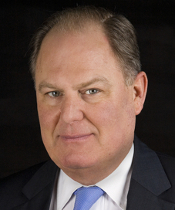Nicholas Dungan, a nonresident senior fellow with the Council’s Program on Transatlantic Relations, was interviewed recently about French President François Hollande’s visit to the United States. In the remarks below, Dungan illuminates the interplay of French and American politics, the impact of Syria on the transatlantic relationship, and how this state visit is viewed from both an French and an American perspective.
François Hollande is the first foreign leader to be invited by Barack Obama for a state visit since his re-election. Is this a sign of renewal in the French-American relationship ? They will discuss Ukraine, Iran, Syria and Africa. Is the working relationship between the two countries a model of international cooperation in a way?
Certainly the overall working relationship between France and the US is excellent and the two countries have a long history of cooperation and very broad government and non-governmental ties, as the two presidents point out in their joint comment today in Le Monde and the Washington Post. But the background to this state visit is more nuanced : France, and François Hollande, were left hanging, alone in leadership, when the UK and then the US lost their nerve on armed intervention in Syria last autumn. French pilots were strapped in and ready to go when Obama (who had himself drawn the ‘red line’) decided to call off the mission and let Congress decide. Indeed, France has taken a tougher leadership position on Iran and Syria than the US, and conducted a highly successful operation in Mali which was far more effective than any recent US-led military intervention. This state visit is at least in part a way of making up for what was felt in Paris to be very much a slap in the face on Syria, and a way of saying thank-you for unflinching across-the-board support that no other ally has provided, and indeed no other ally, including the UK, has the ability to provide. As for Ukraine, everybody wants to forget Victoria Nuland as quickly as possible.
What is the perception of this state visit from the American point of view?
First of all, it’s important to understand what the state visit looks like from a French point of view. This shouldn’t be seen as being about a subordinate France being given the privilege of cozying up to the big American brother. On the contrary, in my personal opinion, the French delegation will be using this visit to judge whether the US is willing and able to lead and to learn. To lead in international affairs — such as Iran, Syria, Mali, where France has indeed been out in front of the US — and to learn, particularly on issues of competitiveness, where France, as described in a recent study I authored, ranks ahead of the United States on all the competitiveness fundamentals, even while the US outclasses France on measurements of competitive performance — all of which provides scope for even greater cooperation.
The American perception of this state visit is, I’m afraid, quite superficial. The two heads of state and the official delegations will of course have serious discussions on policy issues, but almost everyone else is focused on the pomp and the protocol — and the media can’t stop writing about ‘where is the first lady’ since that sells newspapers. What Americans do realize, however, at least at an official level, is that Hollande has full constitutional powers to govern in France for his full term, even with very low popularity ratings. The French will be watching to see how much power Barack Obama actually has, particularly after the Senate majority leader, Harry Reid, slammed the door on fast-track authority for the Transatlantic Trade and Investment Partnership only one day after Obama’s State of the Union message asking for it.
The French president is going to Silicon Valley in part to give a boost to French start-ups and innovation. Does this display a desire to increase business and science cooperation between the two countries?
Even though most people, both in the United States and around the world, think that the US is a highly capitalistic economy driven by the private sector, in reality the United States is one of the countries that does best at cooperation, especially in fundamental research, among the federal government, research universities and other institutions and big business. The Internet came into being that way, the shale gas revolution derives from technology funded by the federal Department of Energy, the National Institutes of Health lead in medical research and so on. So there is a research and innovation model there, which France implements less well. But overall it is a mistake to think that the French model of innovation should replicate the American model, or for that matter the German model. There are lots of French engineers in Silicon Valley (many of them highly pro-American and somewhat anti-French) but there is also a long history of innovation in France from within large companies. Different US and different French sources of excellence can mix by exchanging best practices and clever ideas, rather than trying to import models as such. The main thing is to increase the dialogue among leaders from business, government, civil society, academia, media and other decision-makers, opinion-shapers and influencers.
